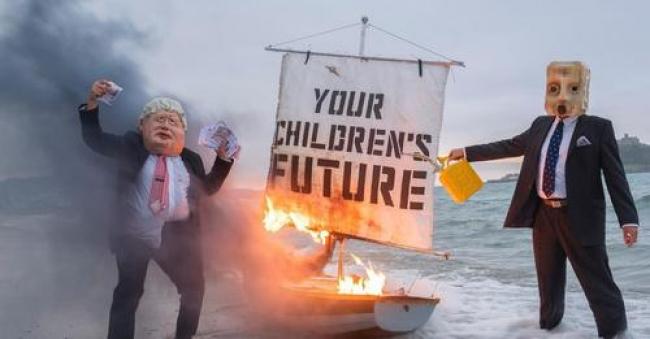Articles Menu

Apr. 4, 2022
The publication of the third and final part of the United Nations' latest comprehensive climate assessment, originally scheduled for early Monday morning, was postponed by several hours after a contentious weekend of negotiations in which wealthy governments attempted to weaken statements about green financing for low-income nations and fossil fuel-producing countries objected to unequivocal language about the need to quickly ditch coal, oil, and gas.
The landmark report by Working Group III of the Intergovernmental Panel on Climate Change (IPCC)—written by dozens of climate scientists from around the world who synthesized the past eight years of relevant research—is expected to call for a rapid global phaseout of fossil fuels to avoid the planetary emergency's most dire consequences.
However, a roughly 40-page "summary for policymakers"—a key reference point for governments—was edited with input from U.N. member states. Although it was expected to be finalized on Friday and published early Monday morning, diplomats continued to debate the contents of the document for hours after their Sunday deadline, pushing its release back by several hours.
"One issue is the fundamental, underlying declaration that the world has to get off fossil fuels as quickly as possible," an unnamed source told CNN on Monday, declining to identify specific nations. "[These objections are] coming from countries with economic interests, from countries that are prioritizing that above what is clearly a global imperative."
"Scientists want to send the extra-clear message that what needs to happen next is to get off fossil fuels to cut emissions as quickly as possible in this decade," the source added.
As CNN reported:
Another sticking point was raised by some developing countries, which demanded that rich nations take more responsibility for their greater historical role in climate change, and that they pay more money to developing nations to help them cut greenhouse gas emissions and adapt to the crisis.
"They want to see clear responsibility taken by richer nations for the heat-trapping emissions they have put into the atmosphere... and to see greater financial flows for developing countries," the source said.
The outstanding issues were so divisive that negotiators were placed in breakout groups to try to address them late Sunday.
The Guardian reported that there were disputes over funding needs for developing countries and "what emphasis to give policies such as phasing out fossil fuel subsidies... Governments have been accused of trying to water down the scientists' findings."
According to the British newspaper:
India has demanded key changes on issues including finance, along with Saudi Arabia which wants to see affirmation of a continued role for fossil fuels, while other countries including China and Ecuador also held out on some points. Russia has played a more muted role than some feared.
"I hope Working Group III has the courage to actually call for the elimination of fossil fuels production and use within a Paris [agreement] compliant timeline," Kevin Anderson, professor at the University of Manchester's Tyndall Centre for Climate Change Research, told The Guardian on Sunday night. Last month, Anderson and his colleague published a report estimating that rich countries must end oil and gas production entirely by 2034 to give the world a 50% chance of limiting global warming to 1.5°C above preindustrial levels by the end of the century.
Last August, out of concern that their conclusions would be diluted by policymakers, a group of scientists leaked a draft of part three of the IPCC report—the U.N.'s sixth comprehensive climate assessment since 1992 and possibly the last to be published with enough time to avert the worst impacts of the crisis. The leaked draft asserted that global carbon emissions must peak by 2025 and all fossil fuel plants worldwide must be shuttered by the end of the decade to meet the Paris agreement's 1.5°C target.
Part two of the IPCC report—described as an "atlas of human suffering and a damning indictment of failed climate leadership" by U.N. Secretary-General António Guterres when it was released in late February—warned that humanity has a "brief and rapidly closing window" to avoid the worst effects of the planetary crisis, which is on track to exacerbate deadly extreme weather, with especially disastrous consequences for the world's poorest and most marginalized.
Rich countries tried to water down its findings, according to climate justice advocates.
[Top photo: Ocean Rebellion staged a theatrical action with a Boris Johnson head and an "Oil head" burning a boat on Marazion beach on June 5, 2021 in Cornwall, United Kingdom. (Photo: Gav Goulder/In Pictures via Getty Images)]